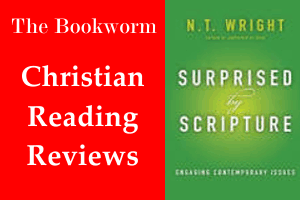Surprised by Scripture: Engaging Contemporary Issues
By: N.T. Wright
Harper-Collins / 2014 / 320 pages
N.T. Wright is a widely-read British Bible scholar and retired Anglican bishop. According to Time Magazine, Wright is one of the most formidable figures in the world of Christian thought. He served as Bishop of Durham between 2003 and 2010. Currently he is Research Professor of New Testament and Early Christianity at St Mary’s College, University of St. Andrews in Scotland. Some commentators have referred to him as a modern C.S. Lewis.
His writing actually opens up the Bible so that it can “speak” into the down-to-earth realities of one’s life. Wright offers fresh perspectives on how to approach Scripture; how readers can be nourished by the Bible day by day. He presents good reasons to ponder and pray through sections of biblical text. His insights encourage readers to ask important questions about how to go deeper in their faith-journey.
The 12 chapters of this book present a collection of N.T. Wright’s essays and talks — case studies that explore how and why the Bible speaks to some of the most pressing contemporary issues. There are interesting surprises between the covers of Surprised by Scripture. Some chapter titles follow:
- Can a Scientist Believe in the Resurrection?
- 9/11, Tsunamis, and the New Problem of Evil
- Idolatry 2.0
- Our Politics Are Too Small
Selected quotes from N.T. Wright’s Surprised By Scripture:
“The question for us, as we learn again and again the lessons of hope for ourselves, is how we can be for the world what Jesus was for Thomas: how we can show to the world the signs of love, how we can reach out our hands in love, wounded though they will be if the love has been true, how we can invite those whose hearts have grown shrunken and shriveled with sorrow and disbelief to come and see what love has done, what love is doing, in our communities, our neighborhoods:”
“science takes things apart to see how they work, but religion puts things together to see what they mean.”
“But from the start the early Christians believed that the resurrection body, though it would certainly be a body in the sense of a physical object, would be a transformed body, a body whose material, created from the old material, would have new properties. That is what Paul means by the “spiritual body”: not a body made out of nonphysical spirit, but a physical body animated by the Spirit, a Spirit-driven body if you like: still what we would call physical but differently animated.”
“The church is not simply a religious body looking for a safe place to do its own thing within a wider political or social world. The church is neither more nor less than people who bear witness, by their very existence and in particular their holiness and their unity (Colossians 3), that Jesus is the world’s true lord, ridiculous or even scandalous though this may seem.”
“Here is the challenge, I believe, for the Christian artist, in whatever sphere: to tell the story of the new world so that people can taste it and want it, even while acknowledging the reality of the desert in which we presently live.”
Gregg Finley
